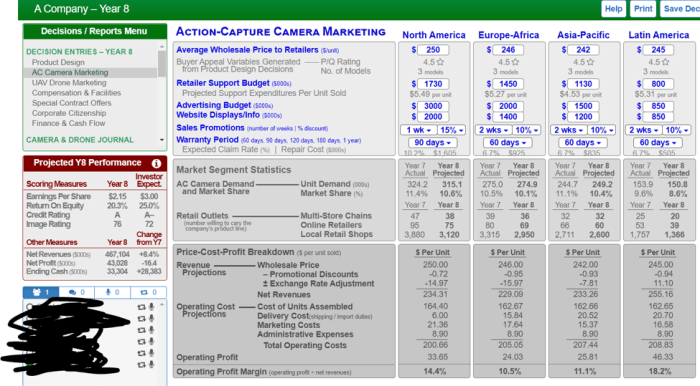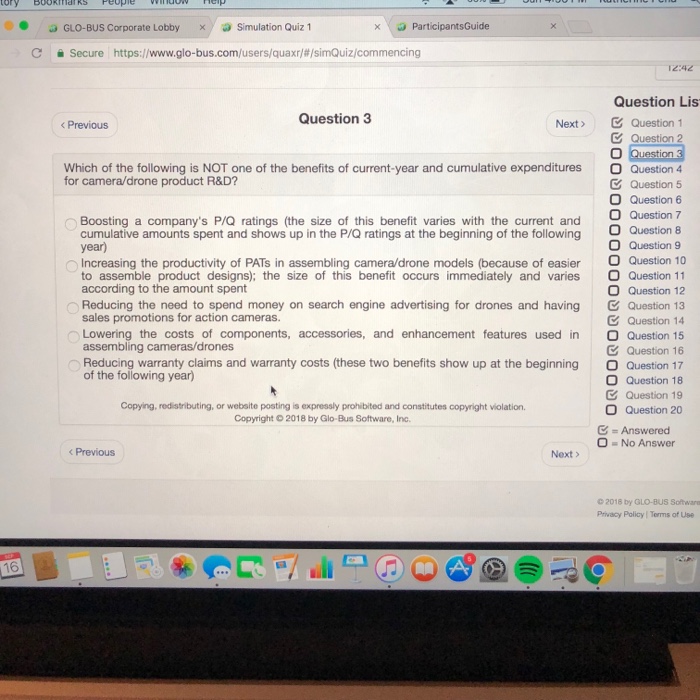Embark on a captivating journey with Glo Bus Simulation Quiz 1, an immersive experience that will challenge your business acumen and strategic thinking. This quiz delves into the fundamental principles of business management and strategy, providing you with a comprehensive understanding of the financial and operational aspects of running a virtual business.
Dive into the intricacies of teamwork and communication, and discover the key concepts you need to excel in this engaging simulation.
As you prepare for Glo Bus Simulation Quiz 1, equip yourself with effective strategies and resources to maximize your performance. Understand the simulation environment, master the techniques for answering various question types, and learn from common mistakes to avoid. With the guidance provided in this comprehensive guide, you’ll be well-equipped to navigate the challenges of the quiz and emerge victorious.
Overview of Glo Bus Simulation Quiz 1

Glo Bus Simulation Quiz 1 is a foundational assessment designed to evaluate your understanding of the core concepts and mechanics of the Glo Bus business simulation.
The quiz covers key topics related to the initial stages of business operations, including market analysis, product development, operations management, and financial planning.
Purpose of the Quiz
- Assess your comprehension of Glo Bus’s user interface and navigation.
- Evaluate your understanding of the simulation’s key performance indicators (KPIs).
- Determine your ability to apply business concepts to practical decision-making within the simulation.
Format of the Quiz
- Multiple-choice questions testing your knowledge of core concepts.
- Short-answer questions requiring you to demonstrate your understanding of specific business principles.
- Case study questions that challenge you to analyze real-world business scenarios within the simulation.
Preparation for Glo Bus Simulation Quiz 1

To excel in Glo Bus Simulation Quiz 1, it’s crucial to equip yourself with effective preparation strategies and leverage available resources. By understanding the simulation environment and familiarizing yourself with key concepts, you can significantly increase your chances of success.
Study Resources
Utilize the following materials to enhance your understanding:
- Glo Bus Simulation Tutorial:A comprehensive guide that provides an overview of the simulation and its functionalities.
- Textbook and Course Materials:Review the assigned textbook and course notes for theoretical knowledge and practical applications.
- Online Resources:Explore online forums, articles, and videos to gain insights and tips from experienced players.
Simulation Environment
Gain a thorough understanding of the simulation environment, including:
- Market Dynamics:Analyze industry trends, customer preferences, and competitive landscapes.
- Financial Management:Comprehend concepts such as budgeting, cash flow management, and profitability analysis.
- Operational Decisions:Master strategies for production, inventory management, and supply chain optimization.
Key Concepts to Understand

To excel in the Glo Bus simulation, a solid grasp of core business principles and effective teamwork is essential. This section will shed light on the fundamental concepts you need to master to succeed.
Fundamental Principles of Business Management and Strategy
- Strategic Planning:Develop a comprehensive plan outlining your business objectives, target market, and competitive strategies.
- Marketing:Understand market research, segmentation, and promotion to effectively reach your target audience.
- Operations:Optimize production, inventory management, and supply chain to ensure efficient operations.
- Finance:Manage financial resources effectively through budgeting, forecasting, and investment decisions.
- Human Resources:Recruit, train, and motivate a skilled workforce to drive business success.
Financial and Operational Aspects of Running a Virtual Business
The simulation requires you to manage the financial and operational aspects of your virtual business:
- Financial Management:Track revenues, expenses, and profitability; make informed decisions on pricing, investment, and financing.
- Operational Management:Optimize production schedules, inventory levels, and distribution channels to minimize costs and maximize efficiency.
- Performance Analysis:Monitor key performance indicators (KPIs) such as sales, market share, and profitability to assess progress and make adjustments.
Importance of Teamwork and Communication in the Simulation
Effective teamwork is crucial for success in the simulation. You will work in teams to make decisions, solve problems, and achieve common goals:
- Collaboration:Share ideas, expertise, and perspectives to enhance decision-making.
- Communication:Use various communication channels (e.g., email, discussion forums) to stay informed and coordinate actions.
- Conflict Resolution:Manage conflicts constructively to maintain team cohesion and productivity.
Tips for Answering Quiz Questions
To excel in Glo Bus Simulation Quiz 1, it’s crucial to adopt effective answering techniques. Here’s a comprehensive guide to help you tackle multiple-choice, true/false, and short-answer questions with confidence.
Glo bus simulation quiz 1 was quite a brainteaser, but I’m sure you’ll ace it. While you’re at it, why not take a break and try out the name that candy bar game ? It’s a fun way to test your sweet tooth and learn about different candies.
Then, come back refreshed and ready to conquer Glo bus simulation quiz 1!
Multiple-Choice Questions
- Read the question and all answer options carefully.
- Eliminate obviously incorrect answers.
- Consider the context of the question and the simulation.
- Select the answer that best aligns with the provided information.
True/False Questions
- Determine if the statement is factually correct.
- Refer to the simulation data and your understanding of the concepts.
- Avoid making assumptions or relying solely on intuition.
Short-Answer Questions, Glo bus simulation quiz 1
- Read the question attentively and identify the key information it seeks.
- Analyze the simulation data and extract relevant insights.
- Provide concise and specific answers that demonstrate your understanding.
Data Analysis and Informed Decisions
The quiz will require you to analyze data and make informed decisions. To do this effectively:
- Use the simulation dashboard and reports to gather data.
- Identify trends, patterns, and key performance indicators.
- Apply your knowledge of business concepts to interpret the data.
- Consider the context of the simulation and the industry.
Time Management
Time management is crucial during the quiz. Here are some tips:
- Allocate time wisely for each question.
- Prioritize questions based on their difficulty and importance.
- Don’t spend too much time on any single question.
li>If you’re unsure about an answer, make an educated guess and move on.
Common Mistakes to Avoid

Overcoming common pitfalls in Glo Bus Simulation Quiz 1 is crucial for success. Here are some prevalent errors to watch out for and guidance on how to steer clear of them.
Misunderstanding Concepts
Students often face challenges due to a lack of clarity regarding key concepts. To avoid this, thoroughly review the course material, attend lectures, and actively engage in discussions. Seek clarification from instructors or peers when needed.
Ignoring Financial Statements
Financial statements are a cornerstone of business decision-making. Failing to analyze them accurately can lead to incorrect answers. Dedicate ample time to understanding income statements, balance sheets, and cash flow statements.
Neglecting Sensitivity Analysis
Sensitivity analysis helps assess the impact of changes in input variables on outcomes. Overlooking this step can result in incomplete or inaccurate conclusions. Utilize the simulation’s sensitivity analysis tools to gain a comprehensive understanding of potential scenarios.
Rushing Decisions
Quiz time is valuable, but rushing through decisions can be detrimental. Take your time, carefully consider the available information, and avoid impulsive choices. Utilize the pause feature if necessary to gather your thoughts.
Failing to Review Feedback
After completing the quiz, it’s essential to review the feedback provided. Identify areas where you excelled and those requiring improvement. This feedback serves as a valuable learning tool for future quizzes and assignments.
Additional Resources

In addition to the materials provided in this quiz, several other resources can help you prepare for and excel in the Glo Bus simulation.
The following table lists some of the most helpful resources, organized by category or topic:
Tutorials
- Glo Bus Tutorial:A comprehensive guide to the Glo Bus simulation, covering all aspects of the game.
- YouTube Tutorials:Search for “Glo Bus Tutorial” on YouTube to find numerous videos that can help you learn the basics of the game.
Videos
- Glo Bus Simulation Overview:A video that provides an overview of the Glo Bus simulation, its objectives, and how to play the game.
- Glo Bus Simulation Best Practices:A video that shares tips and strategies for success in the Glo Bus simulation.
Online Forums
- Glo Bus Discussion Forum:A forum where you can ask questions, share tips, and discuss the Glo Bus simulation with other students.
- Reddit:There is a subreddit dedicated to Glo Bus where you can find helpful information and connect with other players.
Frequently Asked Questions
What is the purpose of Glo Bus Simulation Quiz 1?
Glo Bus Simulation Quiz 1 is designed to assess your understanding of business management and strategy, as well as your ability to apply these concepts in a simulated business environment.
What are some tips for preparing for Glo Bus Simulation Quiz 1?
Familiarize yourself with the simulation environment, study the key concepts of business management and strategy, and practice answering various question types.
What are some common mistakes to avoid in Glo Bus Simulation Quiz 1?
Common mistakes include misinterpreting question instructions, failing to analyze data thoroughly, and making impulsive decisions without considering the long-term consequences.